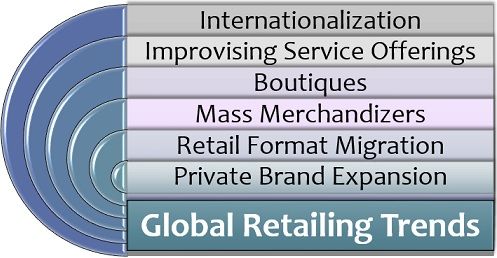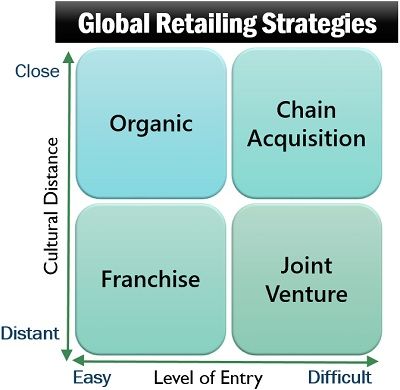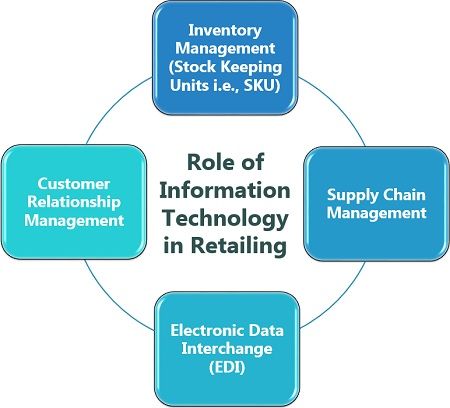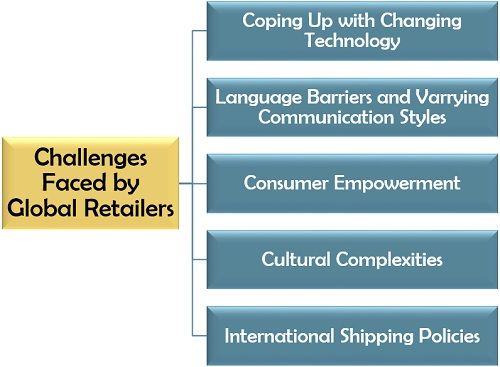Definition: Global retailing is the concept of selling products (i.e., goods and services) across the geographical boundaries of a country to the consumers available in the different parts of the world to attain global presence and recognition and to capture the opportunities prevailing in the potential overseas markets.
The concept of global retailing is widely adopted today by many big brands and organizations to capture the potential markets in multiple countries.
Some of the well-known examples of the companies operating on a global level are ‘Intel’, ‘Facebook’, ‘Toyota’, ‘IBM’, ‘L’Oreal’, ‘PepsiCo’ and ‘Domino’s’.
Content: Global Retailing
Global Retailing Trends
To enter the new markets and avail the business opportunities, the organizations need to understand the presently prevailing flow of global retailing.
Following are some of the most recent trends of global marketing adopted by business entities:

- Internationalization: The companies these days are preferring international markets due to the saturation of the domestic markets and seeking expansion and economies of scale.
- Improvising Service Offerings: In today’s highly competitive market, global retailers are also focusing on adding value to the consumer experience by providing some assistance or services with their products.
- Boutiques: The business organizations are moving towards speciality stores concentrating on a single product line or category to get global recognition for their expertise in a particular product or service.
- Mass Merchandizers: Also, some of the large retail organizations are expanding globally by selling a variety of products or services and having a diversified product line to target high volume of sales at minimal margin or profit.
- Retail Format Migration: There has been a massive transformation in the retailing sector due to the emergence of e-commerce. Therefore, it has become a necessity for companies to adopt e-retailing for creating a global presence.
- Private Brand Expansion: It has become an essential platform for private companies to introduce their products to consumers spread across the globe and also to gain global recognition.
Global Retailing Strategies
Before entering the global market, the organization needs to plan and decide on a suitable business model or strategy by adequately analysing the potential market.
Following are four significant plans of action to select from:

- Organic: The companies planning for global retailing may go with organic strategy, i.e., to open up their stores in different countries. It is a useful strategy if the potential market is culturally close and easy to enter.
- Chain Acquisition: The organizations may purchase an existing company which has multiple stores in the potential market or country. In this strategy, the organizations target markets which are complex and difficult to enter but have a close cultural presence.
- Franchise: One of the most common strategies of global retailing is franchising the business model, brand, procedures, copyrights, etc. and establishing the franchise outlets in different countries. It is a suitable strategy for culturally distant and accessible to enter markets.
- Joint Venture: The organization sometimes collaborate with the already existing companies around the world to enter those markets which posses a high level of entrance difficulty and culturally distant.
Role of Information Technology in Retailing
Whether domestic or global retailing, information technology plays a significant role in simplifying business operations and enhancing the competitiveness of the organizations.
Let us now understand the various ways in which technology supports retail organizations:

Inventory Management (Stock Keeping Units, i.e., SKU)
The management of stock is essential for the organizations which are today done with the help of stock-keeping units (SKUs). It is a system that assigns a unique identification code to every product to identify its price and manufacturer details through scanning of the bar code.
Supply Chain Management
Another essential function of information technology is the supply chain management to streamline the supply of goods or services to the potential and existing markets.
Electronic Data Interchange (EDI)
The introduction of the electronic data interchange has facilitated the trading partners to exchange the business and corporate documents via an electronic medium. Thus, saving time and efforts required for the physical exchange of documents and eliminating distance barriers.
Customer Relationship Management
Information technology has also facilitated the tracking of customers data related to the past buying experience and history, to enhance customer satisfaction and build consumer loyalty.
Challenges Faced by Global Retailers
When an organization moves from domestic to the global market, it has to deal with many problems and complexities.
Given below are some of the global retailing challenges commonly faced by the companies:

- Coping Up with Changing Technology: The organizations today are judged more based on their efficiency receiving and transmitting information. Therefore, the companies operating on an international level need to depend upon the technology and e-retailing platforms.
- Language and Communication Barriers: While selling goods or services overseas, the organization faces difficulty to connect with locals or potential consumers. This is due to the difference in language, preference of communication modes, translation errors, etc.
- Consumer Empowerment: With the rapid change in technology, lifestyle and demand has lead to consumer empowerment and thus, made it difficult for the companies to generate customer loyalty.
- Cultural Complexities: Every market is culturally diverse, and the consumers’ values define their priorities for the goods or services, purchasing power and modes of shopping and making payments. Understanding the culture of the potential market is a complicated task.
- International Shipping Policies: The overseas trading policies like licence, excise duty, taxes and rates, import-export policies, exchange rates, etc. act as a considerable challenge for the companies going global.
Emergence of Global Retailing
In the present era of globalization, every company is trying to create its footprints in different countries of the world.
Global retailing has emerged as a profitable opportunity for the large companies which were earlier operating in the domestic markets. They have now come out of their traditional business models to gain global recognition.
Trading across the geographical boundaries have gained significance due to increasing consumer awareness, preference and purchasing power. Also, the barriers of international trade and policies have been eased out by the government of many countries to promote global trade practices.
Kanchan singh says
I appreciate the way it is communicated. It is full of vital information to begin with the basic concept which helps to make a product global. I shall post my additional comments once I read the full text.
arun says
excellent article , simply explained.